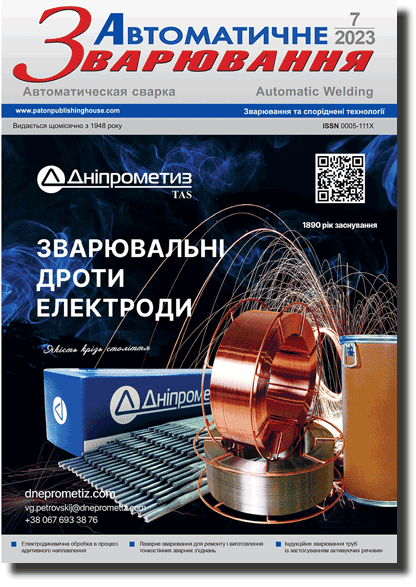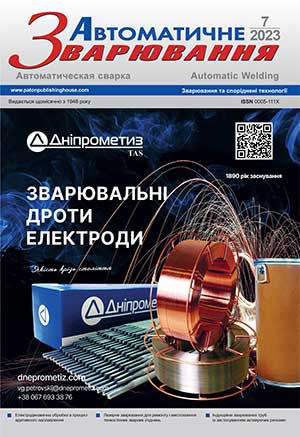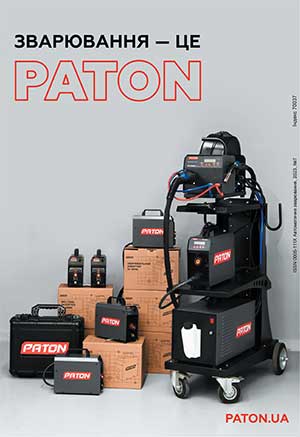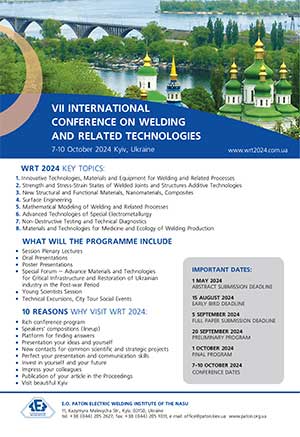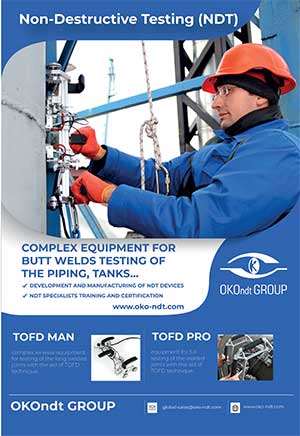| 2023 №07 (06) |
DOI of Article 10.37434/as2023.07.07 |
2023 №07 (01) |
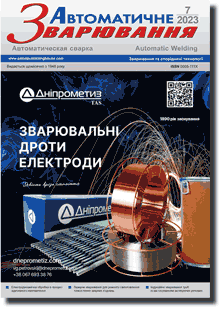
"Avtomatychne Zvaryuvannya" (Automatic Welding), #7, 2023, pp. 54-60
Control of medium enthalpy of plasma flow of N–O–C–H system taking into account the power efficiency of the plasmatron
V.M. Pashchenko
NTUU “Igor Sikorsky Kyiv Polytechnic Institute”. 37 Peremohy Ave., 03056, Kyiv, Ukraine. E-mail: vn.paschenko@ukr.netThe results of experimental studies of the impact of mode parameters on power characteristics of the generator of plasma of N–O–C–H system and medium enthalpy of plasma, generated by the latter were presented. The studies were conducted in a two-electrode plasmatron with two schematic diagrams – with an automatic gas dynamic arc length stabilization and with a selfsetting arc. It is shown that all the benefits of using mixtures of air with a hydrocarbon gas are realized in the case of fixing the arc length in the arc channel. The use of automatic gas dynamic arc length fixation practically allows stabilizing the values of efficiency throughout the whole range of changing generation mode parameters and, at the same time, eliminating the impact of efficiency on the medium enthalpy of plasma flow. The transition to the system N - O (air) reduces the average level of efficiency by 7…10 % and almost twice the value of medium enthalpy. The arsenal of means of influencing the mentioned parameters due to a constant composition of plasma gas reduces. The plasmotron with a self-setting arc on plasma-forming mixtures of the system N-O-C-H has by 15…20 % lower level of efficiency values than in the case of fixing the arc length. The medium enthalpy of plasma depends significantly on the flow-rate and composition of plasma-forming gas. An increase in the values of medium enthalpy by an increase in the arc current leads to deterioration of power characteristics of the plasma generator. Coordination of own power characteristics of the device and parameters of plasma being generated can only be carried out only on the basis of a compromise. 6 Ref., 12 Fig.
Keywords: plasma generator, plasma-forming mixture of air with hydrocarbon gas, plasma of N–O–C–H system, total power, energy losses, efficiency of plasmatron, medium enthalpy of plasma
Received: 07.06.2023
References
1. External_atmospheric_plasma. https://www.oerlikon.com/metco/en/products-services/thermal-spray-equipment/thermal-spray-components/spray-guns/plasma/?tab=external_atmospheric_plasma.2. Atmospheric Plasma Spray Solutions. https://smsbbtim.com/wp-content/uploads/2016/08/Plasma_Solutions_EN5.pdf.
3. Murashov, A.P., Grishchenko, A.P., Vigilyanskaya, N.V. et al. (2012) Efficiency of the use of protective extension in plasma spraying. The Paton Welding J., 2, 28-32.
4. Borisov, Yu.S., Voinarovych, S.G., Kyslytsia, A.N. et al. (2019) Investigation of electrical and thermal characteristics of plasmatron for microplasma spraying of coatings from powder materials. The Paton Welding J., 2019, 11, 19-22. https://doi.org/10.15407/tpwj2019.11.04
5. Pashchenko, V. (2017) Research into the energy conversion processes in hybrid plasma devices for applying the coatings. Eastern-European Journal of Enterprise Technologies, 2 (86), 47-54 https://doi.org/10.15587/1729-4061.2017.95578
6. Pashchenko, V.M. (2018) Arc generators in technologies of surface engineering. Kharkiv, Machulin, 288 [in Ukrainian].
Advertising in this issue:
The cost of subscription/purchase order journals or individual articles
| Journal/Currency | Annual Set | 1 issue printed |
1 issue |
one article |
| TPWJ/USD | 384 $ | 32 $ | 26 $ | 13 $ |
| TPWJ/EUR | 348 € | 29 € | 24 € | 12 € |
| TPWJ/UAH | 7200 UAH | 600 UAH | 600 UAH | 280 UAH |
| AS/UAH | 1800 UAH | 300 UAH | 300 UAH | 150 UAH |
| AS/USD | 192 $ | 32 $ | 26 $ | 13 $ |
| AS/EUR | 180 € | 30 € | 25 € | 12 € |
| SEM/UAH | 1200 UAH | 300 UAH | 300 UAH | 150 UAH |
| SEM/USD | 128 $ | 32 $ | 26 $ | 13 $ |
| SEM/EUR | 120 € | 30 € | 25 € | 12 € |
| TDNK/UAH | 1200 UAH | 300 UAH | 300 UAH | 150 UAH |
| TDNK/USD | 128 $ | 32 $ | 26 $ | 13 $ |
| TDNK/EUR | 120 € | 30 € | 25 € | 15 € |
AS = «Automatic Welding» - 6 issues per year;
TPWJ = «PATON WELDING JOURNAL» - 12 issues per year;
SEM = «Electrometallurgy Today» - 4 issues per year;
TDNK = «Technical Diagnostics and Non-Destructive Testing» - 4 issues per year.





